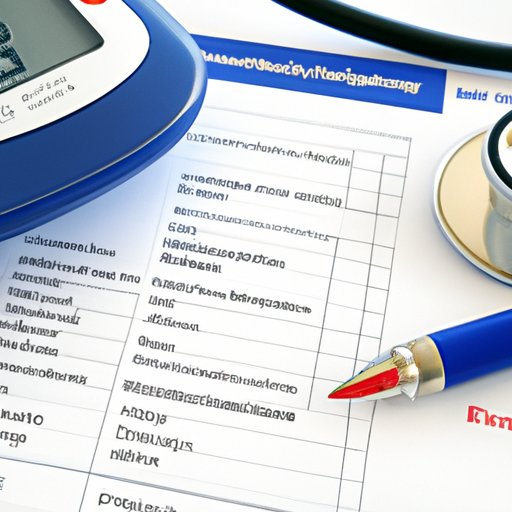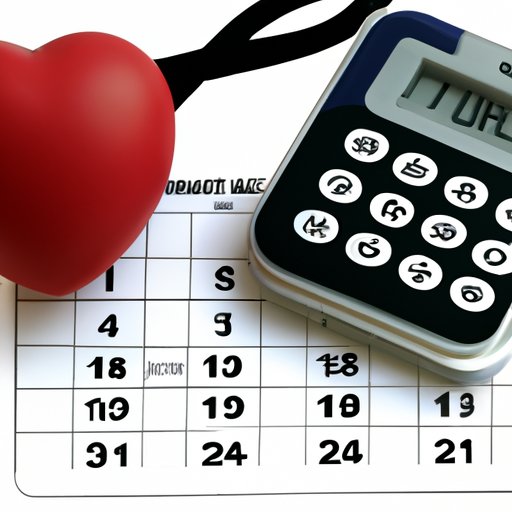
I. Introduction
High blood pressure, also known as hypertension, is a common health condition that affects millions of people worldwide. It occurs when the force of the blood against the artery walls is consistently too high and increases the likelihood of serious health problems such as heart disease, stroke, and kidney disease. Due to its significant prevalence and detrimental effects, managing and treating high blood pressure is crucial to maintain good health and prevent future complications. This article provides readers with a comprehensive guide to understanding high blood pressure, and the different methods that can be used to manage it efficiently, including lifestyle changes, medication, alternative methods, stress management, and regular monitoring.

II. Lifestyle Changes to Manage High Blood Pressure
One of the most effective ways of managing high blood pressure is incorporating lifestyle changes that can help reduce blood pressure levels. Here are some aspects to focus on:
A. The impact of diet on blood pressure
A healthy blood pressure diet involves reducing salt intake, eating more whole grains, fruits, vegetables, and low-fat dairy products, and limiting foods high in saturated and trans fats. Other dietary recommendations include reducing alcohol consumption, avoiding sugary and processed foods, and maintaining a healthy weight.
B. The importance of regular exercise
Regular exercise helps to keep the heart and circulatory system healthy, thereby reducing blood pressure levels. The American Heart Association suggests a minimum of 150 minutes of moderate-intensity aerobic exercise per week or 75 minutes of vigorous-intensity aerobic exercise to achieve the best results in managing high blood pressure. Some examples of recommended physical activities include brisk walking, cycling, swimming, and dancing.
C. The role of sleep in blood pressure management
Getting adequate sleep is crucial for overall health and well-being. Poor sleep habits can increase the risk of developing high blood pressure. It is advised that adults should aim for 7-9 hours of sleep per night, limit caffeine intake, and create a sleep-promoting environment, including eliminating electronic devices and creating a bedtime routine.
D. Tips for incorporating lifestyle changes into daily routine
Individuals can incorporate lifestyle changes by setting goals that are achievable and implementing gradual changes in their daily routine. One can start by making small changes such as swapping unhealthy snacks for fruits, taking stairs instead of elevators, and adding 10 minutes of physical activity to their daily routine. Over time, these small changes will have a significant impact on their blood pressure levels.
III. The Benefits of Meditation for High Blood Pressure
Stress is a contributing factor to high blood pressure. Therefore, learning relaxation techniques such as meditation may be useful in managing stress and regulating blood pressure levels.
A. Overview of stress and blood pressure
Stress causes the body to release hormones such as adrenaline, which raises blood pressure. Over time, chronic stress can lead to persistent high blood pressure.
B. Explanation of how meditation and relaxation techniques can help
Meditation and relaxation techniques are effective ways of reducing stress and promoting a sense of calmness and relaxation. Studies have shown that regular meditation practice can help lower blood pressure and reduce the risk of hypertension.
C. Tips for starting a meditation practice
Individuals can start a meditation practice by setting aside a few minutes each day to meditate. They can begin with deep breathing exercises, body scans, and guided meditations that focus on mindfulness and relaxation. One can also join meditation classes or use mobile applications that provide meditation guidance and tips.
IV. Understanding Medication for High Blood Pressure
In some cases, medication may be necessary to manage high blood pressure. Here is what one should need to know:
A. Overview of commonly prescribed medication for high blood pressure
Medications for high blood pressure include diuretics, calcium channel blockers, ACE inhibitors, beta-blockers, and angiotensin receptor blockers. These drugs work by relaxing blood vessels and lowering blood volume, thereby reducing blood pressure levels.
B. Possible side effects
While medication is generally safe and effective in managing high blood pressure, some individuals may experience side effects such as dizziness, nausea, and fatigue. Thus, it is essential to work with a healthcare provider to adjust medication as necessary and monitor drug interactions with other medications and supplements.
C. Drug interactions to be aware of
The use of over-the-counter drugs and supplements can interact with high blood pressure medications, thereby affecting their efficacy and increasing the risk of side effects. Therefore, it is essential to discuss any OTC drugs or supplements with a healthcare provider before starting or stopping their use.
D. Tips for taking medication as prescribed
A healthcare provider will prescribe medication based on individual health needs. It is essential to take medication as prescribed, at the correct dose, and at the same time each day. Regular blood pressure monitoring and communication with a healthcare provider can help to optimize medication use and modify it based on efficacy and tolerability.
V. Alternative Methods to Manage High Blood Pressure
Other approaches for managing high blood pressure include alternative methods, such as acupuncture, massage therapy, and herbal medicine. Here is what one needs to know:
A. Overview of acupuncture, massage therapy, and herbal medicine
Acupuncture and massage therapies are alternative methods to managing stress and promoting relaxation, which can help lower blood pressure levels. Herbal medicine involves the use of herbs and supplements that are known to regulate blood pressure and maintain heart health.
B. Explanation of how each method can help regulate blood pressure
Acupuncture and massage therapy can help reduce stress, promote relaxation, and stimulate blood flow, thereby lowering blood pressure levels. Herbal medicine, such as garlic, hibiscus, and omega-3 supplements, has been shown to promote heart health and reduce blood pressure levels.
C. Research-backed evidence for each method
Although alternative methods may not be a direct substitute for prescribed medications, research has shown that acupuncture, massage therapy, and herbal medicine can help manage high blood pressure and balance body functions when used in combination with conventional treatment.
D. Tips for incorporating alternative methods into a blood pressure management plan
Individuals should consult with a healthcare provider before starting alternative methods to manage their blood pressure. These therapies should be used only as supplements to regular treatments and should only be performed by certified professionals or licensed herbalists.
VI. The Importance of Regular Blood Pressure Monitoring
Regular blood pressure monitoring is essential in managing high blood pressure and preventing future complications. Here is what one needs to know:
A. Explanation of the significance of monitoring blood pressure levels regularly
Monitoring blood pressure regularly helps to identify changes or deviations from normal levels and allows for prompt intervention and management.
B. Tips for monitoring blood pressure accurately
For accurate blood pressure readings, individuals should rest for five minutes, sit in a supported position with their feet on the ground, and avoid caffeine and smoking for at least thirty minutes before taking the measurement. It is essential to use calibrated equipment, such as an automatic or manual blood pressure monitor.
C. Potential risks of not monitoring blood pressure regularly
Not monitoring blood pressure regularly can lead to undiagnosed hypertension and an increased risk of developing serious health problems such as heart disease, stroke, and kidney damage.
VII. Small Changes That Make a Big Difference for Blood Pressure
Individuals can make tiny changes in their daily routine to manage blood pressure levels. Here are some examples:
A. Explanation of tiny adjustments that individuals can make in daily routines
Some of the tiny adjustments that individuals can make to manage blood pressure include taking deep breaths, engaging in stretching exercises, increasing water intake, and adding potassium-rich fruits and vegetables to their diet.
B. Tips for incorporating small changes effectively
Individuals can incorporate small changes by setting achievable goals and gradually building up healthy habits over time. It is essential to track progress, celebrate achievements, and stay motivated by sharing progress with friends or family members.
C. Examples of small changes that have a significant impact on blood pressure
Some examples of small changes that have a significant impact on blood pressure include practicing yoga, using relaxation techniques, using essential oils, and incorporating meditation or mindfulness exercises into daily routines.
VIII. Stress Management and High Blood Pressure
Stress management is crucial in managing high blood pressure. Here is what one needs to know:
A. Overview of the relationship between stress and blood pressure
Stress causes the body to release hormones that raise blood pressure temporarily. Prolonged stress can lead to persistent high blood pressure and an increased risk of developing serious health problems, such as heart disease, stroke, and kidney damage.
B. Tips for managing stress and anxiety effectively
Effective stress management techniques include deep breathing exercises, guided imagery, yoga, tai chi, and progressive muscle relaxation. Self-care practices such as getting enough sleep, reducing caffeine and alcohol intake, and taking regular breaks from work or stressful situations are also essential.
C. Research-backed evidence for stress management techniques
Studies have shown that practicing stress management techniques can help to significantly reduce blood pressure levels and reduce the risk of hypertension.
IX. Conclusion
Managing high blood pressure is essential to maintain good health and prevent serious health problems. This article has covered several methods of managing high blood pressure, including lifestyle changes, medication, alternative methods, stress management, and regular monitoring. Incorporating some of the methods mentioned can help individuals to regulate their blood pressure and lead a healthier life. It is essential to discuss any concerns or questions with a healthcare provider to develop a tailored plan to manage and treat high blood pressure effectively.




